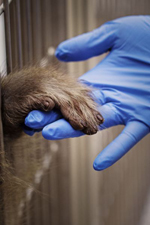Challenge

Positive Reinforcement Training (PRT) and Animal Behavioural Management (ABM) of non-human primates (NHP) used in biomedical experimentation reduce the stress level for the animals, promote more reliable experimental results, facilitate the refinement of methods and procedures and lead to increased safety, for both animals and personnel. Particularly in the neurosciences, behavioural training of the animals is a critical step in many experiments. It could decide on the success or the failure of an experiment. Skilled trainers and skilled training are therefore essential. PRT allows for a more effective training and positively facilitates the compliance of the animal in experimental and husbandry procedures. Both of these effects save time and resources, shorten the experiments and therefore enhance data collection reducing the number of animals needed in experimental procedures. This is not only true for neuroscientific research, but also applies to other fields of research in which NHP serve as a model organism. In combination with appropriate ABM measures, both PRT and ABM provide measures, which actively boost the psychological and physical wellbeing of the animals in the laboratory, as well as have a positive impact on research and lower the number of animals needed for research. Furthermore, well-trained animals, which are physically and psychologically healthy, are very much in demand and have a high market value. Consequently, approximately 15 years ago PRT and ABM were introduced as best practice in most NHP facilities and laboratories across Europe. However, implementing high quality PRT and ABM, which have substantial and long-term benefits for animal welfare and research, is difficult as it requires trained staff of the highest quality. The staff has to be able to develop training protocols and ABM measures according to their facilities resources and research needs. But the experience and education of staff varies. Since NHP research is a small field, it is difficult to network and exchange and opportunities for training on PRT and ABM specifically for laboratory primates. It is therefore important to create opportunities for laboratory NHP staff from different facilities to meet regularly, get educated on ABM and PRT and exchange experience, knowledge and ideas. This is done in order to implement the best possible practice to improve the wellbeing of NHP in their facilities, improve procedures and consequently help to provide a basis for the best possible biomedical research and development of pharmaceuticals.
Two of the proposed Working Groups are also suitable for laboratory animal trainers working with other large laboratory animals. So, although the emphasis is on NHP due to their special requirements, the network will not exclusively deal with this one group of species.
Relevance and timeliness
Currently and for the foreseeable future, central areas of biological and biomedical research depend
on the availability of living non-human primates. This is because many of the most promising
approaches to advance our understanding of human physiology, anatomy and genetics and to
develop new strategies against human diseases depend on research using animals that can provide
models of the human system and the diseases affecting it. This includes aspects of research of
infectious diseases (e.g. HIV, Malaria, Ebola), neurological diseases (e.g. Alzheimer or Parkinson Disease), cancer research, reproduction medicine, the development of new therapeutics (new vaccines, gene therapy), and transplantation research. The need for animal research using nonhuman primates is therefore recognised by all governments that support internationally competitive biomedical research aimed at addressing the world’s most pressing medical challenges.
The fact that NHP have high sensory and cognitive abilities, makes them invaluable medical models but at the same time, handling them demands the highest responsibility. More than any other animal research, scientific studies using NHP have to follow the 3Rs concept of Refinement, Reduction and Replacement. Annex III of Directive 2010/63/EU [Section A, article 3.7] regulates that facilities shall set up training programmes suitable for the animals, the procedures and length of the project and in Annex VIII [“Severity Classification of Procedures”], section II the Directive states that training experience of the animal with respect to the procedure shall be taken into account when assigning a severity category.
The psychological wellbeing of laboratory animals and in particular NHPs has come into the focus of animal rights organisation but also of legal authorities. In NHP research nowadays, animal training and ABM are indispensable, and yet opportunities to build up competence in this field are still insufficient. Here, a multidisciplinary network is proposed of and for animal trainers working with laboratory NHP or other large animals in the laboratory, laboratory staff involved with animal training and/or ABM to improve science with and on primates beyond state-of-the-art and pomote the most elaborate NHP training throughout Europe.
